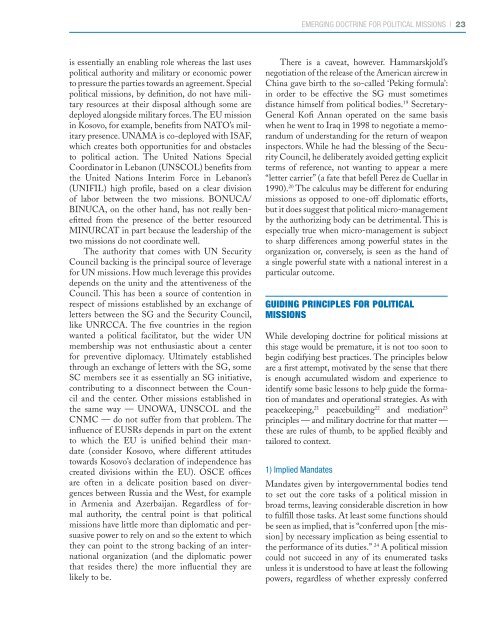Emerging Doctrine for Political Missions - Center on International ...
Emerging Doctrine for Political Missions - Center on International ...
Emerging Doctrine for Political Missions - Center on International ...
- No tags were found...
You also want an ePaper? Increase the reach of your titles
YUMPU automatically turns print PDFs into web optimized ePapers that Google loves.
<str<strong>on</strong>g>Emerging</str<strong>on</strong>g> <str<strong>on</strong>g>Doctrine</str<strong>on</strong>g> <str<strong>on</strong>g>for</str<strong>on</strong>g> <str<strong>on</strong>g>Political</str<strong>on</strong>g> <str<strong>on</strong>g>Missi<strong>on</strong>s</str<strong>on</strong>g> | 23is essentially an enabling role whereas the last usespolitical authority and military or ec<strong>on</strong>omic powerto pressure the parties towards an agreement. Specialpolitical missi<strong>on</strong>s, by definiti<strong>on</strong>, do not have militaryresources at their disposal although some aredeployed al<strong>on</strong>gside military <str<strong>on</strong>g>for</str<strong>on</strong>g>ces. The EU missi<strong>on</strong>in Kosovo, <str<strong>on</strong>g>for</str<strong>on</strong>g> example, benefits from NATO’s militarypresence. UNAMA is co-deployed with ISAF,which creates both opportunities <str<strong>on</strong>g>for</str<strong>on</strong>g> and obstaclesto political acti<strong>on</strong>. The United Nati<strong>on</strong>s SpecialCoordinator in Leban<strong>on</strong> (UNSCOL) benefits fromthe United Nati<strong>on</strong>s Interim Force in Leban<strong>on</strong>’s(UNIFIL) high profile, based <strong>on</strong> a clear divisi<strong>on</strong>of labor between the two missi<strong>on</strong>s. BONUCA/BINUCA, <strong>on</strong> the other hand, has not really benefittedfrom the presence of the better resourcedMINURCAT in part because the leadership of thetwo missi<strong>on</strong>s do not coordinate well.The authority that comes with UN SecurityCouncil backing is the principal source of leverage<str<strong>on</strong>g>for</str<strong>on</strong>g> UN missi<strong>on</strong>s. How much leverage this providesdepends <strong>on</strong> the unity and the attentiveness of theCouncil. This has been a source of c<strong>on</strong>tenti<strong>on</strong> inrespect of missi<strong>on</strong>s established by an exchange ofletters between the SG and the Security Council,like UNRCCA. The five countries in the regi<strong>on</strong>wanted a political facilitator, but the wider UNmembership was not enthusiastic about a center<str<strong>on</strong>g>for</str<strong>on</strong>g> preventive diplomacy. Ultimately establishedthrough an exchange of letters with the SG, someSC members see it as essentially an SG initiative,c<strong>on</strong>tributing to a disc<strong>on</strong>nect between the Counciland the center. Other missi<strong>on</strong>s established inthe same way — UNOWA, UNSCOL and theCNMC — do not suffer from that problem. Theinfluence of EUSRs depends in part <strong>on</strong> the extentto which the EU is unified behind their mandate(c<strong>on</strong>sider Kosovo, where different attitudestowards Kosovo’s declarati<strong>on</strong> of independence hascreated divisi<strong>on</strong>s within the EU). OSCE officesare often in a delicate positi<strong>on</strong> based <strong>on</strong> divergencesbetween Russia and the West, <str<strong>on</strong>g>for</str<strong>on</strong>g> examplein Armenia and Azerbaijan. Regardless of <str<strong>on</strong>g>for</str<strong>on</strong>g>malauthority, the central point is that politicalmissi<strong>on</strong>s have little more than diplomatic and persuasivepower to rely <strong>on</strong> and so the extent to whichthey can point to the str<strong>on</strong>g backing of an internati<strong>on</strong>alorganizati<strong>on</strong> (and the diplomatic powerthat resides there) the more influential they arelikely to be.There is a caveat, however. Hammarskjold’snegotiati<strong>on</strong> of the release of the American aircrew inChina gave birth to the so-called ‘Peking <str<strong>on</strong>g>for</str<strong>on</strong>g>mula’:in order to be effective the SG must sometimesdistance himself from political bodies. 19 Secretary-General Kofi Annan operated <strong>on</strong> the same basiswhen he went to Iraq in 1998 to negotiate a memorandumof understanding <str<strong>on</strong>g>for</str<strong>on</strong>g> the return of weap<strong>on</strong>inspectors. While he had the blessing of the SecurityCouncil, he deliberately avoided getting explicitterms of reference, not wanting to appear a mere“letter carrier” (a fate that befell Perez de Cuellar in1990). 20 The calculus may be different <str<strong>on</strong>g>for</str<strong>on</strong>g> enduringmissi<strong>on</strong>s as opposed to <strong>on</strong>e-off diplomatic ef<str<strong>on</strong>g>for</str<strong>on</strong>g>ts,but it does suggest that political micro-managementby the authorizing body can be detrimental. This isespecially true when micro-management is subjectto sharp differences am<strong>on</strong>g powerful states in theorganizati<strong>on</strong> or, c<strong>on</strong>versely, is seen as the hand ofa single powerful state with a nati<strong>on</strong>al interest in aparticular outcome.Guiding principles <str<strong>on</strong>g>for</str<strong>on</strong>g> politicalmissi<strong>on</strong>sWhile developing doctrine <str<strong>on</strong>g>for</str<strong>on</strong>g> political missi<strong>on</strong>s atthis stage would be premature, it is not too so<strong>on</strong> tobegin codifying best practices. The principles beloware a first attempt, motivated by the sense that thereis enough accumulated wisdom and experience toidentify some basic less<strong>on</strong>s to help guide the <str<strong>on</strong>g>for</str<strong>on</strong>g>mati<strong>on</strong>of mandates and operati<strong>on</strong>al strategies. As withpeacekeeping, 21 peacebuilding 22 and mediati<strong>on</strong> 23principles — and military doctrine <str<strong>on</strong>g>for</str<strong>on</strong>g> that matter —these are rules of thumb, to be applied flexibly andtailored to c<strong>on</strong>text.1) Implied MandatesMandates given by intergovernmental bodies tendto set out the core tasks of a political missi<strong>on</strong> inbroad terms, leaving c<strong>on</strong>siderable discreti<strong>on</strong> in howto fulfill those tasks. At least some functi<strong>on</strong>s shouldbe seen as implied, that is “c<strong>on</strong>ferred up<strong>on</strong> [the missi<strong>on</strong>]by necessary implicati<strong>on</strong> as being essential tothe per<str<strong>on</strong>g>for</str<strong>on</strong>g>mance of its duties.” 24 A political missi<strong>on</strong>could not succeed in any of its enumerated tasksunless it is understood to have at least the followingpowers, regardless of whether expressly c<strong>on</strong>ferred
















